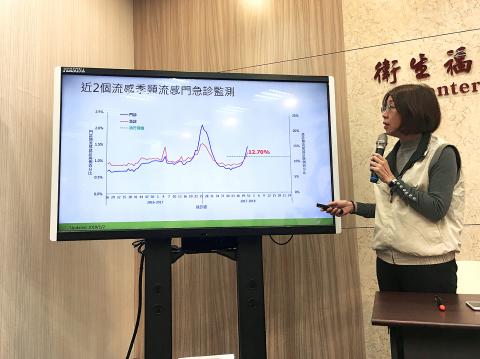The virus targeted by the flu vaccines supplied for this season do not match the dominant virus that is circulating, reducing their efficacy, the Centers for Disease Control (CDC) said yesterday.
According to the CDC’s weekly data, 97,003 cases of flu-like illnesses were reported last week, an increase of 24 percent from the week before, indicating that the nation is experiencing the peak of this flu season.
CDC Epidemic Intelligence Center Director Liu Ting-ping (劉定萍) said that 22 people were confirmed to have serious flu complications, 18 of whom did not receive vaccinations.

Photo: CNA
“The dominant circulating virus is the influenza B virus,” she said, adding that 21 clustered cases were reported in the past four weeks, 16 of which (76 percent) were on school campuses.
The dominant circulating virus is of the Yamagata lineage, but the WHO-recommended composition of trivalent vaccines for use in the northern hemisphere’s flu season was two influenza A viruses (H1N1 and H3N2) and an influenza B virus of the Victoria lineage, CDC Deputy Director-General Chuang Jen-hsiang (莊人祥) said.
“The effectiveness of the vaccine can reach 60 to 70 percent if the predicted influenza B lineage matches the dominant circulating virus,” he said.
“Although the virus was predicted incorrectly, the vaccine can still offer cross-protection against the Yamagata lineage and has a protective efficacy of about 30 to 50 percent, which still reduces the risk of serious complications and death,” Chuang added.
Getting vaccinated still provides protection against infection and maintaining good personal hygiene by washing hands frequently, wearing a mask in crowded places and seeing a doctor when symptoms arise can also enhance protection, he said.
The CDC said the latest WHO report showed that the dominant circulating viruses are influenza A subtype H3N2 in the US and Canada, influenza A subtype H1N1 in Japan and influenza B in Taiwan, Hong Kong, South Korea, China and Europe, adding that people who are planning to travel overseas should take proper pre-emptive measures.

The Ministry of the Interior (MOI) is to tighten rules for candidates running for public office, requiring them to declare that they do not hold a Chinese household registration or passport, and that they possess no other foreign citizenship. The requirement was set out in a draft amendment to the Enforcement Rules of the Public Officials Election and Recall Act (公職人員選舉罷免法 ) released by the ministry on Thursday. Under the proposal, candidates would need to make the declaration when submitting their registration forms, which would be published in the official election bulletin. The move follows the removal of several elected officials who were

The Republic of China (ROC) is celebrating its 114th Double Ten National Day today, featuring military parades and a variety of performances and speeches in front of the Presidential Office in Taipei. The Taiwan Taiko Association opened the celebrations with a 100-drummer performance, including young percussionists. As per tradition, an air force Mirage 2000 fighter jet flew over the Presidential Office as a part of the performance. The Honor Guards of the ROC and its marching band also heralded in a military parade. Students from Taichung's Shin Min High School then followed with a colorful performance using floral imagery to represent Taiwan's alternate name

FOUR DESIGNATED AREAS: Notices were issued for live-fire exercises in waters south and northwest of Penghu, northeast of Keelung and west of Kaohsiung, they said The military is planning three major annual exercises across the army, navy and air force this month, with the navy’s “Hai Chiang” (海強, “Sea Strong”) drills running from today through Thursday, the Ministry of National Defense said yesterday. The Hai Chiang exercise, which is to take place in waters surrounding Taiwan, would feature P-3C Orion maritime patrol aircraft and S-70C anti-submarine helicopters, the ministry said, adding that the drills aim to bolster the nation’s offshore defensive capabilities. China has intensified military and psychological pressure against Taiwan, repeatedly sending warplanes and vessels into areas near the nation’s air defense identification zone and across

COVETED PRIZE: The US president would be a peace prize laureate should he persuade Xi Jinping to abandon military aggression against Taiwan, William Lai said US President Donald Trump should get the Nobel Peace Prize should he be able to convince Chinese President Xi Jinping (習近平) to abandon the use of force against Taiwan, President William Lai (賴清德) told a conservative US radio show and podcast in an interview. The US is Taiwan’s most important international backer, despite the absence of formal ties, but since Trump took office earlier this year he has not announced any new arms sales to the nation. Trump could meet Xi at the APEC summit in South Korea on Oct. 31 and Nov. 1. Lai, speaking on The Clay Travis and Buck Sexton